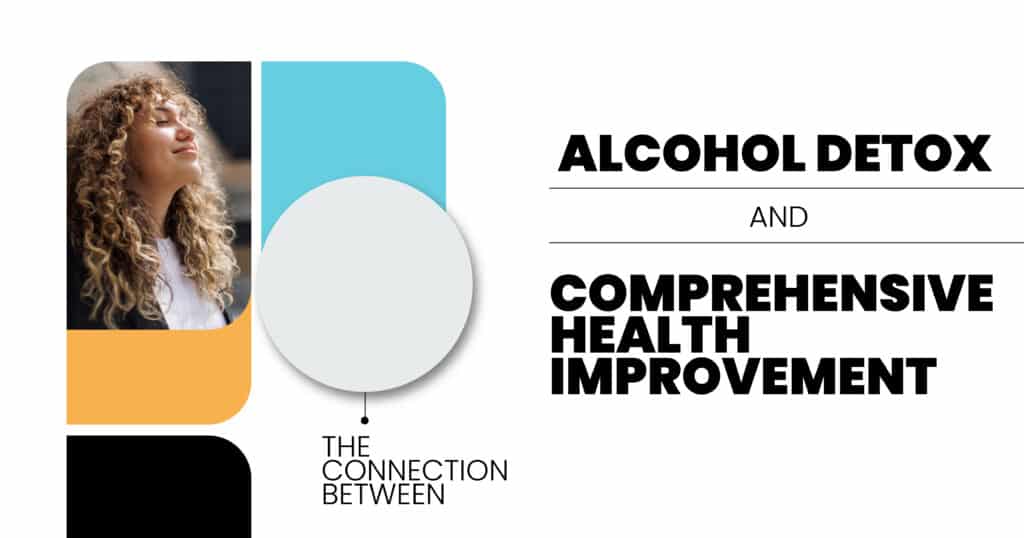Understanding the connection between alcohol detox and comprehensive health improvement is essential for those seeking to overcome addiction and enhance their overall well-being. Alcohol detoxification is a critical first step in the recovery process, but its benefits extend far beyond mere cessation of alcohol use. This article explores how detoxification can lead to important improvements in physical health, mental health, and overall quality of life.
The Importance of Alcohol Detox
What is Alcohol Detox?
Alcohol detox is the process of removing alcohol from the body, typically under medical supervision, to manage withdrawal symptoms safely. This is a crucial step for individuals suffering from alcohol use disorder (AUD), as it sets the stage for further treatment and recovery. The alcohol detox process helps in managing symptoms of alcohol withdrawal such as tremors, anxiety, and seizures. It is important to understand the severity of alcohol withdrawal and the potential health risks involved. Alcohol cravings and craving for alcohol can be intense during this period, highlighting the need for a structured detox plan.
Why is Detox Necessary?
Physical Dependence: Chronic alcohol use leads to physical dependence, making it complex for individuals to quit on their own. Detox helps manage withdrawal symptoms such as tremors, heart palpitations, and seizures. This is especially important for individuals facing severe alcohol withdrawal syndrome. The detoxification for alcohol helps address both mild-to-moderate alcohol withdrawal syndrome and the severe form. Abrupt cessation of alcohol can lead to severe symptoms that require careful management.
Mental Health: Detox allows the brain to begin healing from the effects of alcohol, which can significantly impact mental health. Addressing alcohol-related seizures and mental health issues during detoxification helps stabilize mental health. The detoxification process provides a foundation for managing mental health conditions and psychiatric illness, which may be exacerbated by alcohol misuse.
Physical Health Improvements Post-Detox
Restoration of Organ Function
Chronic alcohol use can damage vital organs, including the liver, heart, and pancreas. Detoxification provides the body with the opportunity to start repairing this damage:
Liver Health: Detox can help reduce fatty liver and inflammation, improving liver function. Heavy alcohol consumption often leads to severe liver damage, making detox crucial for liver recovery. Detoxification of patients with medical comorbidities related to liver damage is particularly beneficial.
Cardiovascular Health: Removing alcohol reduces the risk of hypertension, cardiomyopathy, and stroke. Regular detox can also help lower blood pressure and improve heart rate. For those who engage in heavy drinking or binge drinking, this can significantly reduce the risks associated with heart disease and prolonged alcohol use.
Heart Disease: Detox aids in reducing the risk of heart disease and supports overall cardiovascular health. Mortality rate associated with alcohol-related heart conditions can also be improved with effective detox strategies.
Enhanced Immune System
Alcohol weakens the immune system, making the body more susceptible to infections. Detox helps restore immune function, reducing the likelihood of illness and promoting overall health. Alcohol misuse can compromise immune response, and detoxification helps to mitigate these effects.
Improved Sleep and Nutrition
Detox helps restore standard sleep patterns and appetite, both of which are often disrupted by alcohol use. Improved sleep and nutrition contribute to better physical health and faster recovery. Diet during alcohol detox is critical for supporting recovery and stabilizing overall health. Ensuring adequate blood sugar levels and making dietary adjustments can enhance recovery outcomes. Alcohol intake should be minimized to avoid interference with the detoxification process.
Mental Health Benefits of Alcohol Detox
Reduction in Anxiety and Depression
Alcohol is a depressant that can exacerbate symptoms of anxiety and depression. Detoxification helps stabilize mood by allowing the brain to rebalance neurotransmitter levels:
Serotonin and Dopamine: These neurotransmitters play a critical role in mood regulation. Detox helps restore their natural balance, reducing symptoms of depression and anxiety.
Cognitive Function: Improved mental clarity and cognitive function are often reported post-detox. Enhanced mental status can support better daily functioning and emotional regulation. For individuals experiencing post-acute withdrawal syndrome, cognitive recovery can be particularly beneficial.
Addressing Dual Diagnosis
Many individuals with AUD also suffer from co-occurring disorders such as depression, anxiety, or bipolar disorder. This dual diagnosis can complicate treatment. Detox provides a foundation for addressing both conditions simultaneously, improving the chances of long-term recovery. For those facing co-occurring disorders, Dual Diagnosis Treatment is essential.
The Role of Holistic Approaches in Detox
Comprehensive Health Programs
Holistic approaches to alcohol detox recognize the interconnectedness of physical, mental, and spiritual health. These programs often include:
Mindfulness and Meditation: These practices help manage stress and reduce the likelihood of relapse.
Acupuncture and Yoga: These therapies can alleviate withdrawal symptoms and promote relaxation.
Nutritional Counseling: A balanced diet supports physical recovery and mental health. Nutritional counseling helps in maintaining a healthy diet during detox, addressing issues such as craving in alcohol and ensuring proper diet during alcohol detox.
Benefits of Holistic Detox
Reduced Withdrawal Symptoms: Techniques such as massage therapy and acupuncture can help manage symptoms like anxiety and insomnia. Alcohol hallucinosis and severe symptoms can also be alleviated through these methods.
Overall Wellness: Holistic detox addresses the root causes of addiction, such as trauma or stress, promoting overall well-being. Comparative effectiveness of holistic methods versus traditional approaches can often be seen in improved long-term outcomes.
Sustainable Recovery: Holistic approaches reduce the risk of relapse and support long-term sobriety by addressing all aspects of health.
Support Systems in Alcohol Detox
Importance of Professional Support
Medical supervision during detox is important to ensure safety and manage severe withdrawal symptoms effectively. Healthcare professionals can provide medications and interventions to ease the detox process. Medical detoxification often involves a thorough physical examination and medication management, including the use of benzodiazepines and other anticonvulsants. Beta blockers and anticonvulsant agents such as vigabatrin may also be used based on the severity of alcohol withdrawal syndrome. Doses of benzodiazepines are carefully managed to avoid complications.
Role of Counseling and Therapy
Family therapy and individual counseling play an important role in addressing the psychological aspects of addiction. Therapy provides support, helps individuals develop coping strategies, and addresses underlying issues contributing to substance abuse. Counseling and therapy also assist in managing mental disorders and psychiatric conditions.
Family and Community Support
Strong support systems are vital during and after detox. Family, friends, and support groups like Alcoholics Anonymous provide encouragement that enhances the chances of successful recovery. Support groups and community-based meetings offer valuable emotional support and practical advice.
Long-term Health Improvements
Continuous Recovery Efforts
Detox is just the start of the recovery journey. Long-term health improvements require ongoing efforts, including participation in therapy, support groups, and healthy lifestyle choices. Outpatient treatment and ambulatory care are important components of maintaining sobriety. Outpatient detoxification helps individuals transition from inpatient care to managing their recovery in a less structured environment.
Improved Quality of Life
Successful detox and recovery lead to a significant improvement in quality of life. Individuals often experience:
Better Relationships: Improved communication and emotional stability strengthen personal relationships.
Career and Education: Increased focus and cognitive function enhance job performance and educational pursuits.
Personal Fulfillment: Sobriety allows individuals to pursue hobbies and interests, leading to a more fulfilling life.
Conclusion
The connection between alcohol detox and comprehensive health improvement is profound. Detoxification not only helps individuals break free from their physical dependence on alcohol but also sets the stage for significant improvements in mental health and overall well-being. By embracing holistic approaches and robust support systems, individuals can achieve sustainable recovery and a higher quality of life.
If you or someone you know is struggling with alcohol addiction, seeking professional help for detoxification and ongoing treatment is a crucial step towards a healthier, happier future. For more information on treatment for alcohol withdrawal and outpatient management, consult with a healthcare provider or a specialized treatment facility.









